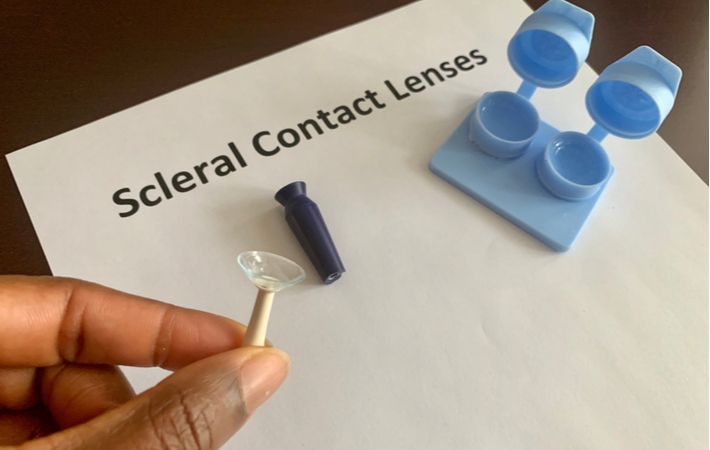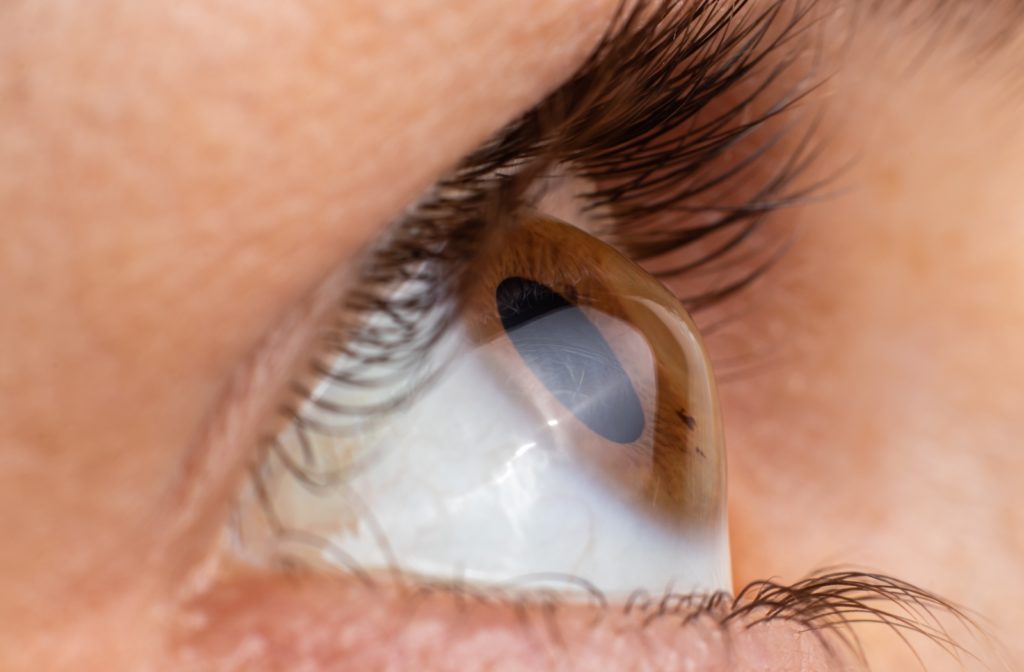Several eye conditions can affect your vision, one being keratoconus. While not an immediate emergency, this condition can affect your cornea and overall vision. If you’re diagnosed with keratoconus, can it be cured?
Continue reading to learn more about keratoconus, including what it is, how it affects you, and if it’s curable.
What is Keratoconus?
Keratoconus is a condition where your cornea, the clear front surface of your eye, thins and begins to bulge outward. Small protein fibers, called collagen, help hold your cornea in place, but complications can occur when they weaken.
Weak fibers can’t hold their shape, making your cornea cone-like, worsening with time. Keratoconus changes your vision in 2 ways. As your cornea changes into a cone shape, its usually smooth surface becomes wavy, known as irregular astigmatism.
Secondly, your vision becomes more nearsighted as the front of the cornea expands. Seeing far-away objects with this condition is difficult, with everything looking like a blur.
You may notice other symptoms, such as:
- Double vision when using one eye
- Near & far objects appear blurry
- Halos appearing around bright lights
- Light streaks
- Blurry vision when driving
If you’re experiencing some of the symptoms of keratoconus, what causes this condition?
What Causes Keratoconus?
Unfortunately, there isn’t a known cause for this condition. Some researchers believe that keratoconus can be present from birth. Several possible factors may have a link to this condition, such as:
- Family history
- Age
- Certain disorders
- Inflammation from allergies & asthma
- Eye rubbing
- Race
With this condition typically worsening with time, is there a chance that keratoconus can damage your vision?
Can Keratoconus Damage Your Vision?
Untreated keratoconus can lead to severe vision loss because your cornea cannot focus without glasses or contact lenses. Some cases of this condition may require a corneal transplant if vision is significantly affected.
Someone with keratoconus shouldn’t receive laser eye surgery like LASIK. This procedure can further weaken the cornea, making your vision worse.
If you have concerns about your vision, how does your optometrist diagnose this condition?
How Do You Diagnose Keratoconus?
Your optometrist will conduct a comprehensive eye examination to determine if you’re having any problems. Some of the potential diagnosis tools they may use include:
- Eye refraction
- Slit-lamp examination
- Keratometry
- Computerized corneal mapping
After diagnosing any present issues, your eye doctor will recommend a suitable treatment plan. If you have keratoconus, can it be cured?
Can Keratoconus Be Cured?
There is no cure for keratoconus, but you can manage it effectively with treatment. The most effective treatment for this condition depends on its severity. There are several treatments available to help effectively manage keratoconus.

Keratoconus Treatment
Keratoconus treatment depends on the severity of the condition and how quickly it’s progressing. There are generally 2 ways to manage this condition. Treatments focus on slowing keratoconus progression or improving your vision.
Your optometrist can recommend the best treatment for you, including:
Contact Lenses
Several contact lenses can benefit someone with keratoconus. The best contacts for you depend on the severity of this condition, but some possible lenses include:
- Soft contact lenses: Soft lenses are ideal for correcting blurry or distorted vision in the early stages of keratoconus. You may need to change your prescription several times as your cornea’s shape changes.
- Rigid gas permeable lenses: Rigid gas permeable lenses come from a firmer material. They are ideal for more advanced keratoconus. The material may feel uncomfortable at first but adjust with time.
- Hybrid contact lenses: Hybrid contact lenses have a rigid gas permeable center and a softer surrounding lens. They can be more comfortable to wear than rigid gas permeable lenses.
- Scleral lenses: Scleral lenses are beneficial for someone with advanced keratoconus. These lenses vault over the cornea and rest on the whites of your eyes (sclera), creating a smooth optical surface.
It’s beneficial to have an optometrist experienced with keratoconus fit your contacts, especially for scleral or rigid gas permeable lenses. Regular checkups are important when receiving new contacts to determine if your lenses fit properly.
Corneal Collagen Cross-Linking
Corneal collagen cross-linking is a newer treatment designed for keratoconus. It involves using eyedrop medication and ultraviolet (UV) light to increase the strength of the tissue inside your cornea. It adds bonds between the collagen fibers in the eye.
While this treatment can be beneficial, it won’t reverse any previous damage done to your eyes. Corneal collagen cross-linking focuses on preventing your condition from worsening.
Surgery
Doctors typically recommend surgery for severe cases of keratoconus that have caused significant changes to the cornea or your vision.
2 main surgical options are available depending on the location of the bulging cornea and severity. These surgical options are:
- Penetrating keratoplasty: A full corneal transplant where donor tissue replaces parts of the central cornea.
- Deep anterior lamellar keratoplasty (DALK): This procedure preserves the inner lining of the cornea, helping avoid potential complications that may happen in a full corneal transplant.
If you have keratoconus, there are several treatments available to help manage this condition. Your optometrist can help determine the best treatment for your unique needs.
Don’t Ignore Symptoms of Keratoconus
While blurry vision may seem like a temporary problem, don’t ignore symptoms of keratoconus. The earlier your eye doctor diagnoses an eye condition, the earlier you can receive treatment.
If you’re having any symptoms of keratoconus, contact your optometrist.



